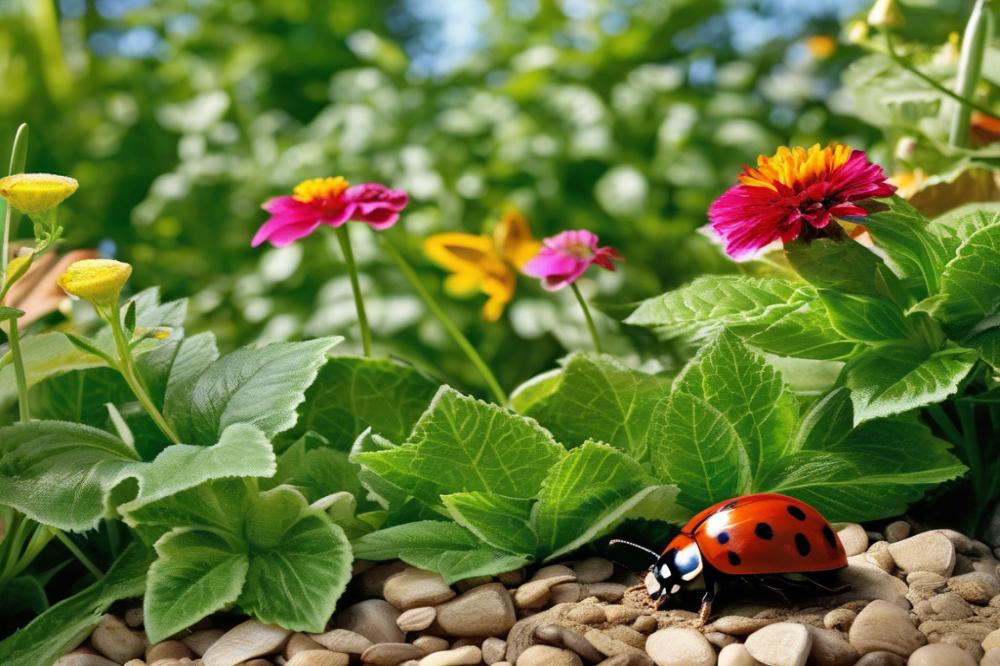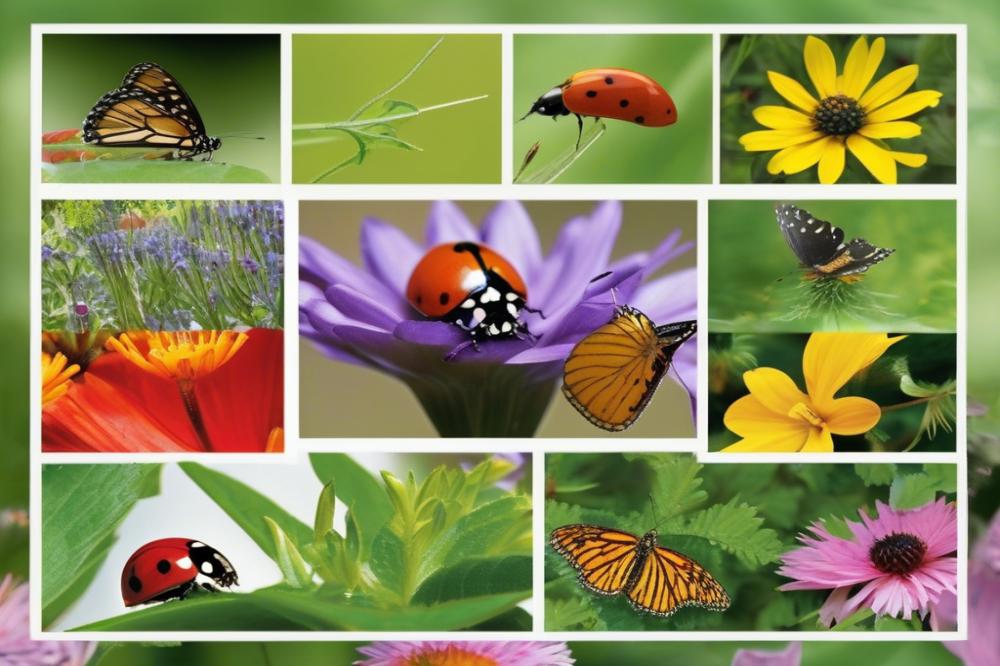The Role of natural predators in Creating a Pest-Free Garden
organic gardening emphasizes the need for efficient pest management. Instead of relying on chemicals, gardeners can turn to nature for solutions. Many insects play a crucial role in maintaining a healthy garden environment. This helps keep annoying pests at bay while supporting biodiversity.
beneficial insects such as ladybugs, lacewings, and hoverflies are key players in pest control. These creatures naturally feed on common garden pests, including aphids. Introducing these allies into your garden can significantly enhance garden health. Their presence helps create an ecosystem balance that thrives without chemical interventions. It’s a win-win situation for both nature and gardeners.
Understanding the role of beneficial insects is essential. For instance, ladybugs are famous for their appetite for aphids. This makes them valuable allies, especially when aphid populations explode. Lacewings, with their delicate wings, also contribute by consuming pests. Hoverflies add another layer of protection, targeting aphids and other harmful insects. With these bugs in your garden, the need for extensive pest management decreases.
Incorporating these natural predators into your garden setup can enhance not just pest control but also overall plant health. By fostering a friendly environment for these insects, gardeners can minimize the use of synthetic pesticides. This approach leads to a more sustainable practice. Building a healthy ecosystem encourages beneficial insects to thrive, thus promoting long-term garden resilience.
Understanding Natural Predators


Natural predators are organisms that help control pest populations in gardens. They play a crucial role in the environment by keeping harmful insects in check. By introducing these creatures, gardeners can maintain a healthier ecosystem balance.
Insects like ladybugs, lacewings, and hoverflies are key players. These beneficial insects are nature’s allies against pests like aphids. They naturally consume large numbers of these unwanted visitors. This biological pest control method reduces the need for chemical sprays, which can be harmful to the environment.
Biodiversity is essential in any garden. A diverse range of plants can support a variety of these helpful insects. This variety creates a more resilient ecosystem. When different species coexist, they contribute to overall garden health.
Cultivating a garden with minimal disturbance allows beneficial insects to thrive. organic gardening practices, such as composting and mulching, also support these systems. Healthy soil encourages the growth of plants that attract these natural pest controllers.
Understanding the importance of this balance can transform a garden. By focusing on ecological methods, you can promote an environment that manages pests effectively. Incorporating these practices can lead to a vibrant and flourishing garden that thrives without heavy reliance on chemicals.
Types of Beneficial Insects


In the world of organic gardening, beneficial insects are the unsung heroes. They play vital roles in pest management, helping to keep gardens thriving and healthy. Among these helpful creatures, ladybugs, lacewings, and hoverflies stand out for their effectiveness in controlling pests, especially aphids.
Ladybugs
Ladybugs are perhaps the most recognized beneficial insects. Their bright red bodies with black spots are hard to miss. Adult ladybugs and their larvae are voracious eaters of aphids. A single ladybug can consume up to 50 aphids a day! By attracting more ladybugs to your garden, you can significantly reduce aphid populations.
Lacewings
Lacewings are another important ally in biological pest control. Known for their delicate, lacy wings, these insects are also referred to as “aphid lions.” Lacewing larvae are fierce predators, consuming many soft-bodied pests, including aphids. Their presence helps maintain ecosystem balance, promoting healthier garden conditions.
Hoverflies
Hoverflies may not look imposing, but they are highly effective in pest management. Resembling small bees, these flies also play a crucial role in aphid control. Adult hoverflies feed on nectar and pollen, but their larvae are predators that eat aphids and other pests. This lifecycle supports natural equilibrium within the garden.
Attracting a diverse range of these beneficial insects promotes a balanced ecosystem. A varied insect population aids in garden health, ensuring that no single pest can dominate. Creating habitats such as flower beds can invite ladybugs, lacewings, and hoverflies to nest and thrive. Planting a mix of flowers will encourage these insects to visit and feed, leading to a more resilient garden.
Incorporating these strategies can enhance pest management efforts. Understanding the roles of these beneficial insects and fostering their presence is essential for any gardener aiming for success. Their presence not only controls pests but also contributes to a rich and diverse garden environment.
Implementing Biological Pest Control


Creating a pest-free garden can be an ongoing challenge for many gardeners. However, utilizing beneficial insects as part of your strategy can be a game changer. Encouraging their presence fosters a natural ecosystem and helps with organic gardening. This approach leads to sustainable pest management without relying on synthetic chemicals.
One effective method to attract these helpful creatures involves planting desirable flowers. Umbelliferous plants like dill and fennel are especially appealing to hoverflies. Their larvae are incredible predators of aphids, providing an excellent layer of aphid control in your garden. Additionally, growing various flowering plants will create a buffet for ladybugs and lacewings, which can also help combat pests.
Another strategy is to avoid using pesticides. Synthetic chemical sprays not only kill harmful insects but also wipe out beneficial insects that contribute to ecosystem balance. This can lead to more pest problems down the line, as natural competitors are eliminated. Instead, embrace a more holistic approach.
Providing habitats is also essential for maintaining populations of beneficial insects. Creating small shelters with stones or logs gives them safe places to hide from predators. Furthermore, leaving some debris in your garden can offer a resting space for vital pollinators and predators alike. These small changes can significantly improve garden health.
Companion planting represents another smart technique for bolstering beneficial insect populations. Certain plants, like marigolds, can deter pests while attracting natural helpers. When you plant these flowers strategically, you can instigate a healthy interdependence that nurtures your garden. Diverse plant life not only attracts specific insects but also enriches soil health and overall resilience.
Monitoring your garden frequently allows you to observe which beneficial insects are taking residence. Identifying these allies makes it easier to support them. Keeping an eye out for larvae can indicate that predators are active, as lacewings will lay eggs near aphid colonies. Successful pest management requires ongoing observation and adaptation.
By implementing these biological pest control strategies, gardeners can cultivate a thriving environment rich in beneficial insects. Practicing these methods will contribute to a balanced ecosystem, protecting your plants naturally. In the long run, your garden will become a sanctuary for both plants and the critters that help them flourish.
Integrating Organic Remedies with Natural Predators


Maintaining a healthy garden often involves a careful balance. Beneficial insects play a crucial role in this process. They help control pests like aphids without the need for harsh chemicals. By using organic solutions alongside these insects, gardeners can create a thriving ecosystem.
Organic gardening allows for various methods that work hand in hand with nature. For instance, using neem oil is an effective strategy. This organic pesticide targets specific pests while leaving beneficial insects like ladybugs untouched. It’s essential to apply it in the evening when these allies are less active. This timing minimizes any negative impacts on the ecosystem.
Lacewings are another great ally in pest management. They consume a variety of pests, including aphids and mealybugs. In gardens, integrating companion planting can also help attract these beneficial insects. By growing certain flowers nearby, you can enhance the diversity of your garden and bolster natural pest control efforts.
Hoverflies add another layer of complexity. Their larvae feast on aphids, which can quickly become a problem in many gardens. If you incorporate organic remedies, such as insecticidal soap, make sure to handle it with care. Spraying too close to hoverfly larvae can disrupt their development and reduce their populations.
Always monitor the health of your garden. An ecosystem in balance is crucial for long-term success. Engage in practices that promote both pest management and beneficial insect conservation. For example, avoid broad-spectrum pesticides that target a wide range of insects. These can decimate both harmful pests and allies alike.
Examples of effective combinations can include applying diatomaceous earth around the base of plants. This measure can deter soft-bodied pests while sparing insects that benefit your garden. Another tactic involves using garlic spray. While it repels pests, it typically doesn’t affect ladybugs or lacewings. Such remedies can fortify your efforts in organic gardening.
The goal is not to rely solely on one method but to utilize a variety of strategies. By integrating these approaches, you create a more resilient and self-sustaining garden. Ultimately, this leads to better garden health and yields. Prioritizing biological pest control enhances not only your plants but also the life surrounding them.
Case Studies and Examples
Many gardeners have turned to beneficial insects to manage pests effectively. A well-documented case is the community garden in Elmwood. This garden, once plagued by aphids, experienced a dramatic transformation. Gardeners introduced ladybugs, known for their voracious appetite for these tiny pests. Within weeks, the number of aphids dropped significantly, showcasing the power of biological pest control.
Another inspiring example comes from Sunnydale Organic Farm. Here, lacewings were released to combat a caterpillar problem. These delicate creatures, sometimes called “aphid lions” in their larval stage, helped maintain the right ecosystem balance. Farmers reported healthier crops and less need for chemical interventions. The overall health of the garden improved as natural tactics took precedence over synthetic solutions.
In Crestview, residents embraced hoverflies to tackle a persistent spider mite issue. These beneficial insects not only feasted on the mites but also pollinated nearby plants. The gardens flourished, attracting even more helpful creatures, creating a thriving habitat for wildlife. Gardeners soon realized that an effective pest management strategy included inviting diverse species into their plots.
All these cases highlight the importance of working with nature. It’s clear that integrating organic gardening practices can yield fruitful results. Instead of relying solely on commercial pesticides, these gardeners learned that fostering an environment rich in natural predators enhances garden health. Their journeys into pest control opened new avenues for sustainable practices.
From these examples, a lesson emerges: a healthy garden ecosystem thrives when balanced. Encouraging a variety of beneficial insects can lead to pest-free plants. Understanding this cycle is essential for any successful gardener. The real secret lies in observing nature and utilizing its strength.
Final Thoughts on a Pest-Free Garden
Integrating natural predators into pest management can significantly reduce the need for chemical interventions. These helpful creatures provide a reliable method for controlling unwanted insects in gardens. When beneficial insects are invited into your space, they create a balanced ecosystem. This approach supports a healthier environment, promoting biodiversity.
Organic gardening focuses on using natural methods to combat pests. Utilizing these predators aligns perfectly with sustainable practices. Skipping synthetic pesticides not only protects the garden but also reduces harmful chemicals in our ecosystems. Many gardeners have seen substantial improvements by simply allowing nature to do its job.
Embracing natural methods encourages a more harmonious relationship with the earth. Creating habitats for these helpful insects can be as simple as planting native flowers or avoiding broad-spectrum chemicals. By doing so, you foster a thriving community of organisms that work together to keep pests at bay.
In summary, combining organic gardening techniques with the support of natural solutions leads to stronger plants and fewer pests. Everyone can contribute to a healthier ecosystem. The next time you think about managing pests, consider the benefits of working with nature. Your garden will thank you for it!



